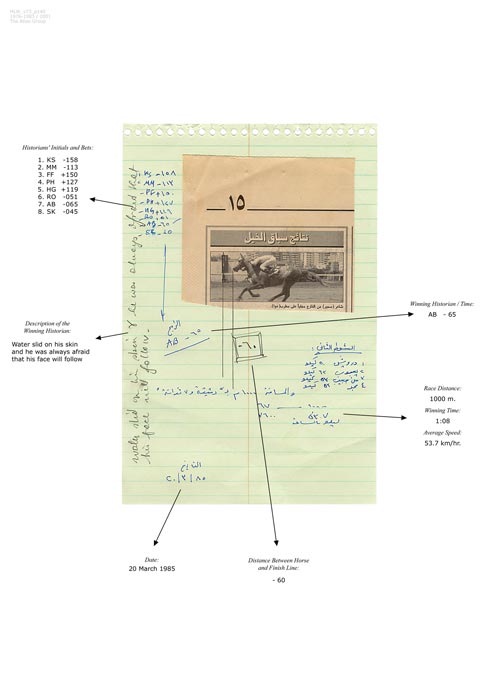The Atlas Group / Walid Raad
The Fakhouri File: Missing Lebanese Wars, 1996-2002
Artist
The Atlas Group / Walid Raad
Title
The Fakhouri File: Civilizationally, we do not dig holes to bury ourselves
Year of creation
1996-2002
Technology and dimensions
21 framed digital prints, each 33 x 25 cm
Year of acquisition
2008
Acquisition of the foundation
Walid Raad founded the fictional collective The Atlas Group in Beirut in the late 1990s. The works created in this context deal with the Lebanese civil war from 1975 to 1990/1991 and its consequences, with memory and trauma, with war and normality and with authorship and truth.
The Fakhouri File, the extensive archive of the equally fictional, famous Lebanese historian Dr. Fadl Fakhouri, in addition to two Super 8 short films, video tapes and photographs, includes 226 notebooks with texts and collages that can be understood as audiovisual, literary or photographic documents. One of the notebooks, which will be displayed framed as a series, bears the number 72 and the title Missing Lebanese wars. This work, which like the others is accompanied by a text, is about the credibility of images. Dr. In it, Fakhouri reports on the pastime of Lebanese historians: not betting on the winning horse in Sunday horse races, but rather betting on how many fractions of a second the photographer will miss the horse's exact moment at the finish line. Each page documents the participants' bets, the results and the photo of the winning horse from the following day's edition of a Beirut daily newspaper. In pencil, Fakhouri adds a comment on the character of the respective winner of the bet, for example: “He's not just unhappy, he's brilliant at it. No occasion is too trivial to ignite in him an ecstasy of self-mortification.”
Miraculous beginnings, one of the two short films, strings together Fakhouri's shots of the moments when the historian considered the war to be over. In No, illness is neither here nor there, however, one shot of doctors' and dentists' practices follows the next - showing that there were also thriving businesses in war-torn Beirut. Three categories of files form the system of the fictitious-real archive, of which the Fakhouri file is a part: Type A are documents that are assigned to an identifiable individual, type FD includes discovered documents and type AGP includes documents assigned to the Atlas Group. This is the material basis for Atlas Group exhibitions, performances and publications. The material suggests the construction of history as a continuous narrative composed of reports and individual and collective experiences.
The resulting archive space, which is only temporarily realized differently in the context of the exhibition, is just as situated between fact and fiction as the Atlas Group itself - an imaginary foundation whose chairman and only member is Walid Raad himself. With this speculative collective, Raad highlights questions about re-presentation, the supposed objectivity of historiography and the representation of the present.
Ina Dinter and Anna-Catharina Gebbers
